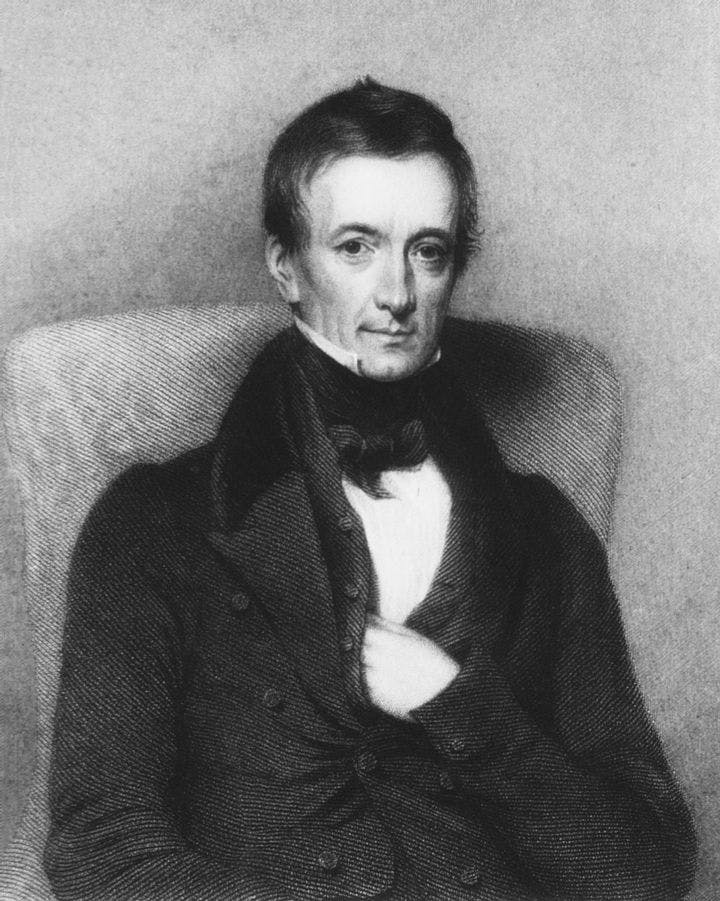Spring 2008
Organization Man
– Barbara Wallraff
Barbara Wallraff says that Joshua Kendall’s biography of Peter Mark Roget is "an absorbing account of a remarkable man."
We owe a greater debt to mental illness than is commonly recognized. An inmate in an asylum for the criminally insane made important contributions to the Oxford English Dictionary. The eminent lexicographer Samuel Johnson exhibited “odd compulsions, such as pausing to touch every lamppost as he walked down Fleet Street,” as Joshua Kendall mentions in The Man Who Made Lists. The subject of Kendall’s biography, Peter Mark Roget, exhibited obsessive-compulsive behavior more than a century before his diagnosis was coined. Evidently, people with mental illness are gravely at risk for compiling language-reference books.
Not that Roget (pronounced ro-zhay) thought of his 1852 Thesaurus of English Words and Phrases as anything so modest. His ambition was to classify all knowledge. His wasn't the first book of English synonyms—that was published in 1766 by one John Trusler—but it was original in that it listed the user’s options without commentary or editorializing. An English physician and scientist born in 1779, Roget lived in an age when much science consisted of classifying and taxonomizing—plants, animals, “electrical bodies,” human intellectual faculties, and so forth. Kendall writes,
Just as his hero, the 18th-century naturalist Carl Linnaeus, divided animals into six classes, Roget divvied up his one thousand concepts as follows:
I. Abstract Relations
II. Space
III. Matter
IV. Intellect
V. Volition
VI. Affections
That outline for the thesaurus, together with the range of Roget’s accomplishments, might lead one to suspect the good doctor of megalomania—though the truth is more nearly that he was just doing what well-educated men of the time did. Over the years, Roget developed a new laboratory test for arsenic poisoning; published a mathematical paper on the slide rule, invented the log-log scale, “the centerpiece of the modern slide rule”; discovered that “the retina typically sees a series of still images as a continuous picture,” thereby laying the theoretical groundwork for movies; and, as the capstone on a successful career as an academic physiologist (though some accused him of plagiarism and playing favorites), published a 250,000-word treatise on animal and vegetable physiology that earned him renown in America for the first time. Not until he was 73 did he get around to publishing his thesaurus, and he edited new editions of it until his death 17 years later, in 1869. This retirement project of his has gone on to sell nearly 40 million copies.
Roget traveled in interesting circles. As a young man, he worked for the jurist and philosopher Jeremy Bentham and the chemist Humphry Davy. He crossed paths with Samuel Taylor Coleridge and William Wordsworth, Madame de Staël, and Erasmus Darwin, Charles’s grandfather, who not only translated Linnaeus but set him to verse. He met William Franklin, Ben’s son, and chatted with him about kites and electricity. He helped to organize a book club that Isaac D’Israeli, Benjamin Disraeli’s father, was invited to join.
Obsessiveness, anxiety, and depression can shadow even the sunniest of lives, but into Roget’s life much rain did fall. He was four when his father died, more or less permanently unhinging his mother. Over the years, he watched his mother and daughter go mad and his sister battle chronic depression, and he had much to reproach himself for when his beloved uncle, Sir Samuel Romilly, committed suicide by slitting his throat with a razor. Cancer robbed him of his wife after less than 10 years of marriage. Kendall emphasizes—even harps on—Roget’s MO of using intellectual activity to cope with emotional problems and tragedy.
As befits a book about a man who strove to help us find exactly the words we want, The Man Who Made Lists is for the most part elegantly written. Occasionally, though, Kendall’s brain goes on autopilot, with results such as “the entire city was then down in the dumps” and “By August, Peter’s recovery was in full swing.” And I would have preferred if Kendall had either used his imagination less or told us where he got scene details such as “After saying a quick goodbye to his mother . . .” and “Roget’s jaw dropped.” But these are cavils/quibbles/trivial objections, to quote from the illegitimate offspring of Roget’s that resides on my computer. All in all, The Man Who Made Lists is an absorbing account of a remarkable man.
* * *
Barbara Wallraff writes columns on language for The Atlantic Monthly and King Features Syndicate, and is the author of Word Fugitives (2007), Your Own Words (2004), and Word Count (2000).
Reviewed: "The Man Who Made Lists: Love, Death, Madness, and the Creation of Roget's Thesaurus" by Joshua Kendall, Putnam, 2007.
Image courtesy of Wikimedia Commons
